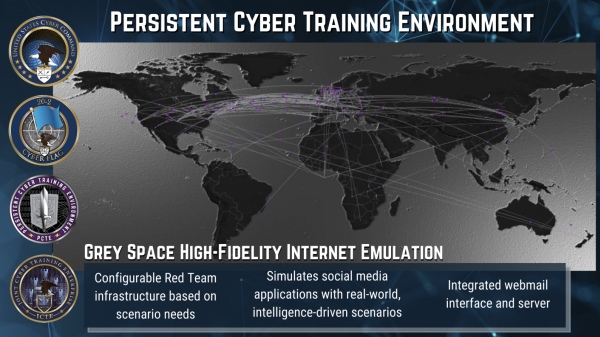Published on the 10/12/2020 | Written by Jonathan Cotton

Australia will contribute to the development of its high-tech collaborative simulated training domain…
Australia has signed the Cyber Training Capabilities Project Arrangement, a bi-lateral agreement with the United States’ Department of Defense enabling the US Cyber Command to incorporate Australian Defence Force feedback into the organisation’s simulated training domain, the Persistent Cyber Training Environment (PCTE).
So what is the PCTE?
The PCTE is a cyber training platform for ‘real-world defensive missions across boundaries and networks’. Simply put, the PCTE lets cyber forces log on from anywhere in the world for online training and to rehearse missions.
“We’ve refocussed our efforts to invest in emerging and smart technologies that will strengthen our ability to fight and win our nation’s wars.”
The first production version of the PCTE was delivered in February this year, and is designed as a distributed, secure, reconfigurable environment where numerous independent cyber operations training activities may occur simultaneously. These environments include virtual emulations of live networks that allow cyber operators the ability to practice their skills and operations in a closed environment.
Previously, US and allied cyber forces have developed cyber training ranges for specific scenarios and to be used only once. The PCTE will offer a collaborative training environment, enabling cyber forces around the world to develop and re-use already-existing content.
Users can train at individual and group levels anytime.
The deal is the first cyber-only arrangement established between the US Army and an allied nation. Valued at US$215.2 million over six years, the Department of Defense says that the platform’s shared use and development will see it constantly evolve to ‘sharpen readiness’ in cyber tactics, techniques and procedures.
“A key aspect of PCTE, which provides the earliest access to capabilities, is the incorporation of an iterative development process,” says Cyber Command, the United States’ Department of Defense’s cyberspace arm. “This process allows for the continued development and improvement of PCTE while it is in use by cyber warriors.”
According to the organisation, the long-term goal for PCTE is to provide the DoD cyberspace workforce ‘the capability to build and conduct full-spectrum, combined and joint cyberspace training, exercises, certification and mission rehearsal in a training environment’, with ‘a realistic operational environment that provides scope, scalability and fidelity’.
“This project arrangement is a milestone for US-Australian cooperation” says Elizabeth Wilson, the US signatory and deputy assistant secretary of the Army for Defense Exports and Cooperation.
To counter known and potential adversarial threats, the US Army has recalibrated its strategic thinking, says Wilson.
“We’ve made smart decisions to refocus our efforts to invest in the new, emerging and smart technologies that will strengthen our ability to fight and win our nation’s wars.”
Wilson says that partnerships in cyberspace are key to ‘generating and sharing insights of threat actors, enabling mutual defense against cyber attacks, and conducting the operational training necessary to hold adversaries accountable in cyberspace’.
Training platforms such as the PCTE will enable ‘lethal cyber mission forces in defence of US and allied interests’.
“Agreements like this one are crucial to the efficiency of our joint modernisation,” Wilson says. “They lay the framework for our mutual growth, allowing us to become stronger and more interoperable as allies.”




























